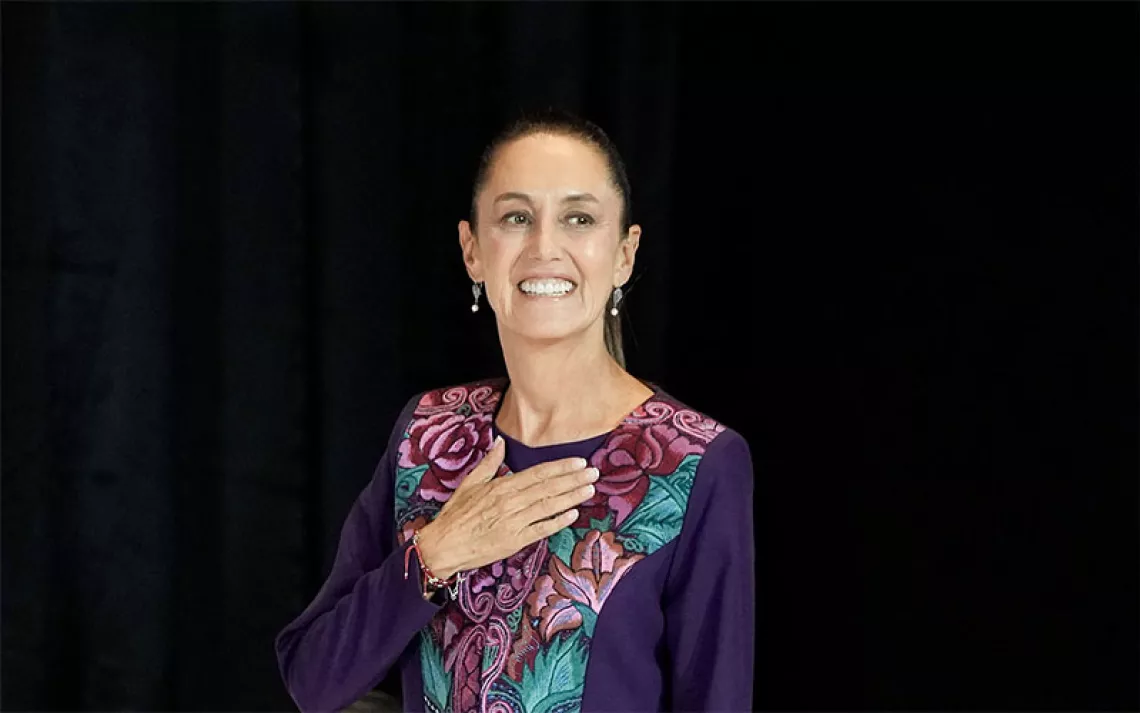A Red Line for Climate Greenwashing
UN expert panel at COP27 warns that many net-zero pledges are more like “creative accounting”

Illustration by iStock/Tanaonte
This story was originally published by The Guardian and is republished here as part of Covering Climate Now, a global journalism collaboration strengthening coverage of the climate crisis.
A United Nations group set up to crack down on the greenwashing of net-zero pledges by industry and government has called for “red lines” to stop support for new fossil fuel exploration and overuse of carbon offsets.
The “high-level expert group,” created in March by the UN secretary general, António Guterres, to advise on rules to improve integrity and transparency in net-zero commitments by industry, regions, and cities, said climate plans must include deep cuts in greenhouse gases before 2030 and not delay action until closer to 2050.
It stressed serious commitments must prioritize immediate cuts in absolute emissions, with the use of carbon offsets—an often-controversial practice that allows companies and governments to pay for cuts elsewhere instead of reducing their own pollution—to be used sparingly in later years, if at all. Rules were needed to ensure offsets were high-quality and came from a reliable and verifiable source, the group said.
The group of experts was created after widespread concern about greenwashing, including claims by major fossil fuel companies that they were aiming for net-zero emissions by 2050 while backing new coal, oil, and gas developments and relying heavily on offsets.
A Guardian investigation this year revealed that oil and gas companies, including several with net-zero pledges, were still planning vast new developments that would push the world well beyond the goals of the landmark 2015 Paris Agreement. In Australia, they include Woodside, which has taken on BHP’s global petroleum assets and is planning to open new fields off the northwest coast.
Net-zero plans already adopted have drawn criticism for being vague, delaying action until it is too late, and relying too heavily on reductions claimed from unrelated nature-based offset projects, such as tree planting and supporting forest regrowth. While offsets have enjoyed wide support from governments and industry as a cheaper way to cut pollution than absolute cuts, the experts said they should only be used after a business or regional or local government had met short- and medium-term targets.
Releasing the report at the COP27 climate conference in Sharm el-Sheikh, the expert group’s chair, the former Canadian climate minister Catherine McKenna, said net-zero pledges must be “about cutting emissions, not corners.”
“Right now, the planet cannot afford delays, excuses, or more greenwashing,’ she said.
Panel member Bill Hare, a climate scientist and chief executive of Climate Analytics, said no one could ignore the need to “immediately and drastically cut emissions.”
“If industry, financial institutions, cities, and regions mean what they say in their net-zero pledges, they will adopt these recommendations,” he said. “If fossil fuel companies think that they can expand production under a net-zero target, they need to think again.”
The experts said non-state actors should have to report publicly each year, backing up their claims with verifiable information, to prevent dishonest climate accounting. They called for voluntary net-zero commitments for large corporate emitters to be replaced with regulated requirements and said industry must address “scope 3” emissions—those released through the use of their products—as well as direct pollution.
Guterres said, “A growing number of governments and [companies] are pledging to be carbon free—and that’s good news. The problem is that the criteria and benchmarks for these net-zero commitments have varying levels of rigor and loopholes wide enough to drive a diesel truck through,” he said. “We must have zero tolerance for net-zero greenwashing.”
The secretary general also had strong words for fossil fuel companies: “So-called ‘net zero pledges’ that exclude core products [coal, oil, gas] are poisoning our planet. Using bogus net-zero pledges to cover up massive fossil fuel expansion is reprehensible. This toxic cover-up could push our world over the climate cliff.”
The report was backed by Laurence Tubiana, the chief executive of the European Climate Foundation and considered one of the architects of the Paris Agreement as French environment minister. She said living up to that deal demanded drawing “a clear line on true net zero—what it really means and requires, and what is simply greenwashing.”
“We can’t afford creative accounting,” she said. “I urge all actors—including cities, regions, businesses, investors, alliances, countries, and regulators—to take these recommendations seriously and embed them with urgency.”
 The Magazine of The Sierra Club
The Magazine of The Sierra Club



